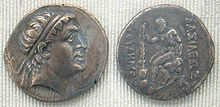| Revision as of 10:43, 3 July 2016 editOmnipaedista (talk | contribs)Autopatrolled, Extended confirmed users, Pending changes reviewers242,962 edits not linked from the template← Previous edit | Revision as of 10:41, 17 October 2016 edit undoGoldsmelter (talk | contribs)150 edits →Notes: coinNext edit → | ||
| Line 40: | Line 40: | ||
| ==Notes== | ==Notes== | ||
| ] | |||
| <references /> | <references /> | ||
Revision as of 10:41, 17 October 2016
Greco-Bactrian king| Euthydemus I - Ευθύδημος Α΄ | |
|---|---|
| Greco-Bactrian king | |
 Coin with Greek inscription reads: ΕΥΘΥΔΗΜΟΥ ΘΕΟΥ i.e. "of Euthydemus God", Euthydemus qualified as "THEOS" ("God"). (Pedigree coin of Agathocles of Bactria.) Coin with Greek inscription reads: ΕΥΘΥΔΗΜΟΥ ΘΕΟΥ i.e. "of Euthydemus God", Euthydemus qualified as "THEOS" ("God"). (Pedigree coin of Agathocles of Bactria.) | |
| Reign | 230–200 BC |
| Predecessor | Diodotus II |
| Successor | Demetrius I |
| Dynasty | Euthydemid dynasty |

Euthydemus I (Greek: Εὐθύδημος Α΄; c. 260 BC – 200/195 BC) was a Greco-Bactrian king in about 230 or 223 BC according to Polybius; he is thought to have originally been a satrap of Sogdiana, who overturned the dynasty of Diodotus of Bactria and became a Greco-Bactrian king. Strabo, on the other hand, correlates his accession with internal Seleucid wars in 223–221 BC. His kingdom seems to have been substantial, including probably Sogdiana to the north, and Margiana and Ariana to the south or east of Bactria.
Biography
Euthydemus was allegedly a native of Magnesia (though the exact site is unknown), son of the Greek General Apollodotus, born c. 295 BC, who might have been son of Sophytes, and by his marriage to a sister of Diodotus II and daughter of Diodotus I, born c. 250 BC, was the father of Demetrius I according to Strabo and Polybius; he could possibly have had other royal descendants, such as sons Antimachus I, Apollodotus I and Pantaleon.
Little is known of his reign until 208 BC when he was attacked by Antiochus III the Great, whom he tried in vain to resist on the shores of the river Arius (Battle of the Arius), the modern Herirud. Although he commanded 10,000 horsemen, Euthydemus initially lost a battle on the Arius and had to retreat. He then successfully resisted a three-year siege in the fortified city of Bactra, before Antiochus finally decided to recognize the new ruler, and to offer one of his daughters to Euthydemus's son Demetrius around 206 BC.
Classical accounts also relate that Euthydemus negotiated peace with Antiochus III by suggesting that he deserved credit for overthrowing the descendants of the original rebel Diodotus, and that he was protecting Central Asia from nomadic invasions thanks to his defensive efforts:
- "...for if he did not yield to this demand, neither of them would be safe: seeing that great hords of Nomads were close at hand, who were a danger to both; and that if they admitted them into the country, it would certainly be utterly barbarised." (Polybius, 11.34).
The war lasted altogether three years and after the Seleucid army left, the kingdom seems to have recovered quickly from the assault. The death of Euthydemus has been roughly estimated to 200 BC-195 BC, and the last years of his reign probably saw the beginning of the Bactrian invasion of South Asia.

There exist many coins of Euthydemus, portraying him as a young, middle-aged and old man. He is also featured on no less than three commemorative issues by later kings, Agathocles, Antimachus I and one anonymous series. He was succeeded by Demetrius, who went on to invade northwestern regions of South Asia. His coins were imitated by the nomadic tribes of Central Asia for decades after his death; these imitations are called "barbaric" because of their crude style.
Notes

- Polybius. The Histories. Book XI chap. 34 v. 1.
{{cite book}}: Cite has empty unknown parameter:|coauthors=(help); Unknown parameter|nopp=ignored (|no-pp=suggested) (help) - Strabo, Geography 11.11.1
- ^ Polybius 11.34 Siege of Bactra
- "Two Remarkable Bactrian Coins" RC Senior, Oriental Numismatic Society Newsletter 159
External links
| Preceded by: Diodotus II or Antiochus Nikator |
Greco-Bactrian Ruler | Succeeded by: Demetrius I |